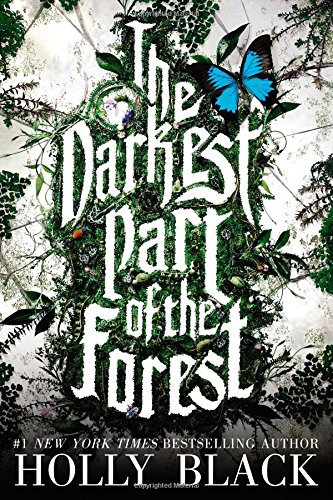In her newest stand-alone young adult novel, The Darkest Part of the Forest, Holly Black returns to familiar and exciting territory: faeries and dark magic at the crossing between human and nonhuman worlds. Most folks are familiar with Black’s series “A Modern Tale of Faerie” (Tithe, Valiant, and Ironside) which ran from 2002 to 2007; that series set up Black as a daring and clever writer of young adult stories that tend to feature queer kids and deal honestly with complex emotional and social issues.
The Darkest Part of the Forest follows also on the heels of Black’s last young adult novel, another stand-alone (The Coldest Girl in Coldtown)—and I like the trend that these two books have been setting for her work going forward. Both are solid, well-paced and play interesting games with the tropes of the genre of supernatural YA; both star girls who make fucked-up decisions and are trying to learn to care about themselves and others in the aftermath. The shared narrative of growth here is more complex than just “getting older” and instead deals more with “learning to cope and be whole.”
That’s the sort of thing I’m interested in seeing, especially in young adult fiction, and I’ve loved to see recent books that engage with these issues. I’d describe The Darkest Part of the Forest, from one angle, as a frank and yet still genre/age-oriented exploration of post-traumatic stress, childhood neglect, emotional damage, and learning to be a whole person. It’s also a pleasurable and fast-paced faerie romp with monsters, knights, and a prince woken from a cursed slumber—so, there’s certainly a balance.
Black skates across the difficult emotional spectrum of her characters, here, delving just deeply enough to paint a serious picture of their experiences without losing track of the driving plot and rising action. There’s a maintained air of action and movement throughout that does keep the narrative from spending as much time as it might on the interior worlds of the protagonists—siblings Hazel and Ben, but primarily Hazel—but I found that, at the end, I had enough knowledge of their inner states to fill in the blanks.
Their childhood, in particular, gets a treatment that I thought was delicate but sincere. Hazel’s narrative throughout the book—from her own point of view—paints her parents’ early lifestyle as a sort of adventure. We know she and her brother were left to forage in the woods and fend for themselves often; that’s how they end up hunting cruel faeries in the first place as preteens. From her perspective, this is relatively sanitized, though. The reader gets the sense of the terror she felt when killing the first monstrous faerie, after discovering a dead body at the lake and after the faerie kills her dog—but when we stop and think, for a moment, about Hazel’s age at the moment, it’s far more sinister.
This comes to fruition in the end, when she’s discussing her habit of emotional distance with Jack. He suggests that she might have more reasons than just a bad faerie bargain to have kept her distance from other people. As he says, “The parties your parents used to throw were legendary, but I’ve heard the stories about you and your brother eating food out of the dog’s bowl, like it was a joke. Heard you tell the story, too, like it was a joke. You talk about your childhood like it was just wild, bohemian fun, but I remember how much it wasn’t fun for you.” He’s more aware, in that moment, of her trauma than she is.
But she comes to acknowledge it, and when she’s cursed to regain all of her memories—including those she personally put aside, papered over—she has to come to terms with that trauma as well. It’s a sort of quest story, with a magic sword, a wicked king and a rescued prince, in which Sir Hazel the knight must regain herself at the end. That’s the grail: healing and coming to terms with trauma so she can open up to another person and pursue a relationship that might be healthy for both people.
That’s good stuff, and I liked reading it.
As for the plot, it’s a good time. The typical opening does its job of grabbing the reader’s attention. There’s a cursed prince in a glass coffin and a town on the edge of faerie; our protagonist kisses boys but doesn’t love them, and she kisses her brother’s best friend at a party; the love triangle is set. Except the proceedings aren’t typical after all, because in the end the prince loves her brother and she ends up with the best friend. Black plays with the tropes in terms of expectations, here: I thought there was going to be a struggle for the mortal girl between the two handsome faerie boys, but I should have known better. And I was pleased to see it turn out the way it did, which also feels narratively satisfying.
The mystery is a little obvious, perhaps, but it’s still a fun experience and a fast read. The action scenes can come across as a little long, and sometimes it seems as if the pacing is a bit too breakneck—that actions of the characters in the world at large feel a little overly telegraphed to move the story along—but overall, it’s a solid story and I appreciated reading it. More for the thematic and emotional content, perhaps, but that’s the strong stuff at the heart of the adventurous fun; it’s what makes this a good book. I’d recommend it.
The Darkest Part of the Forest is available now from Little, Brown Books for Young Readers. Read an excerpt from the novel here on Tor.com
Lee Mandelo is a writer, critic, and editor whose primary fields of interest are speculative fiction and queer literature, especially when the two coincide. She can be found on Twitter or her website.










